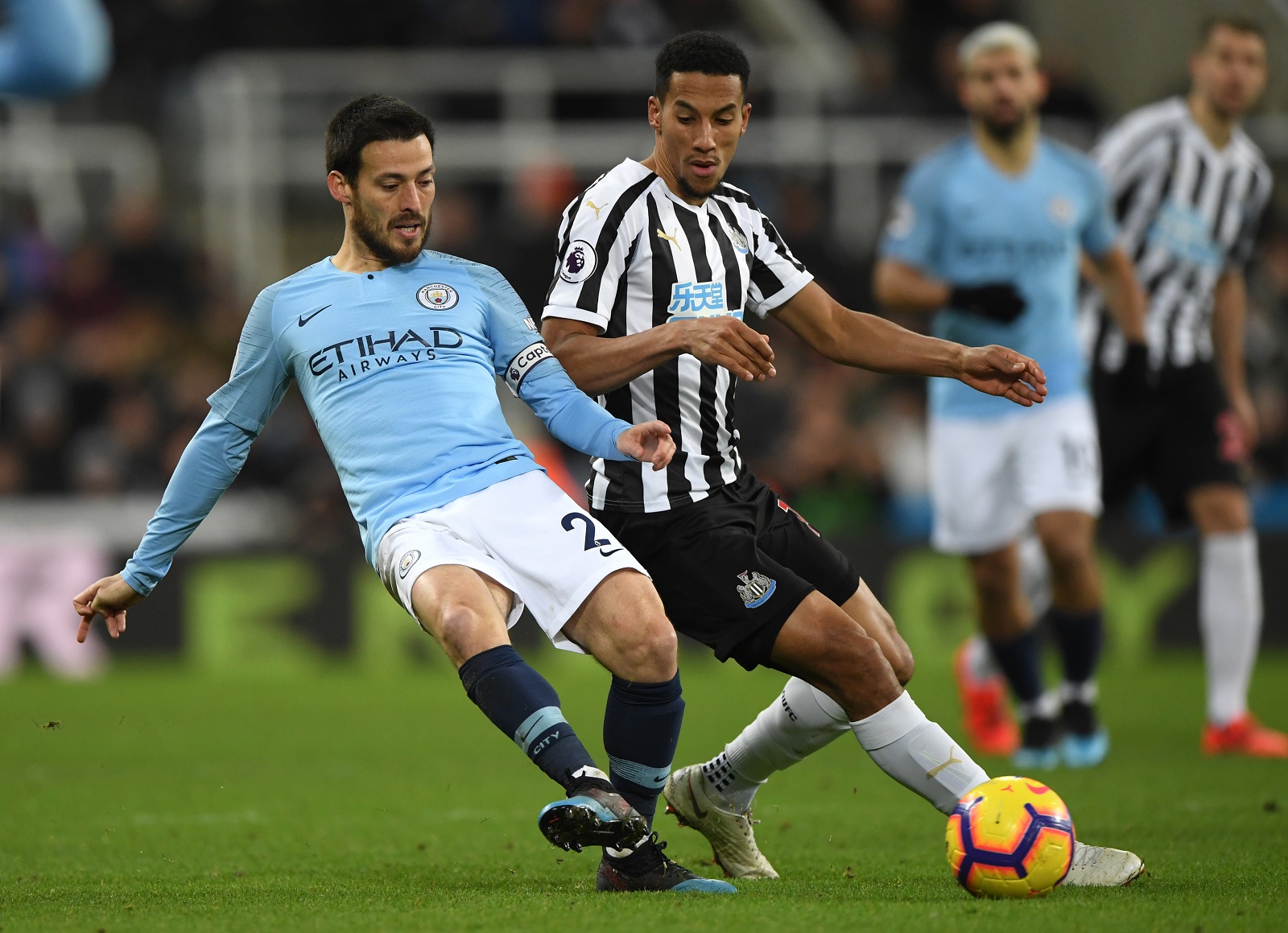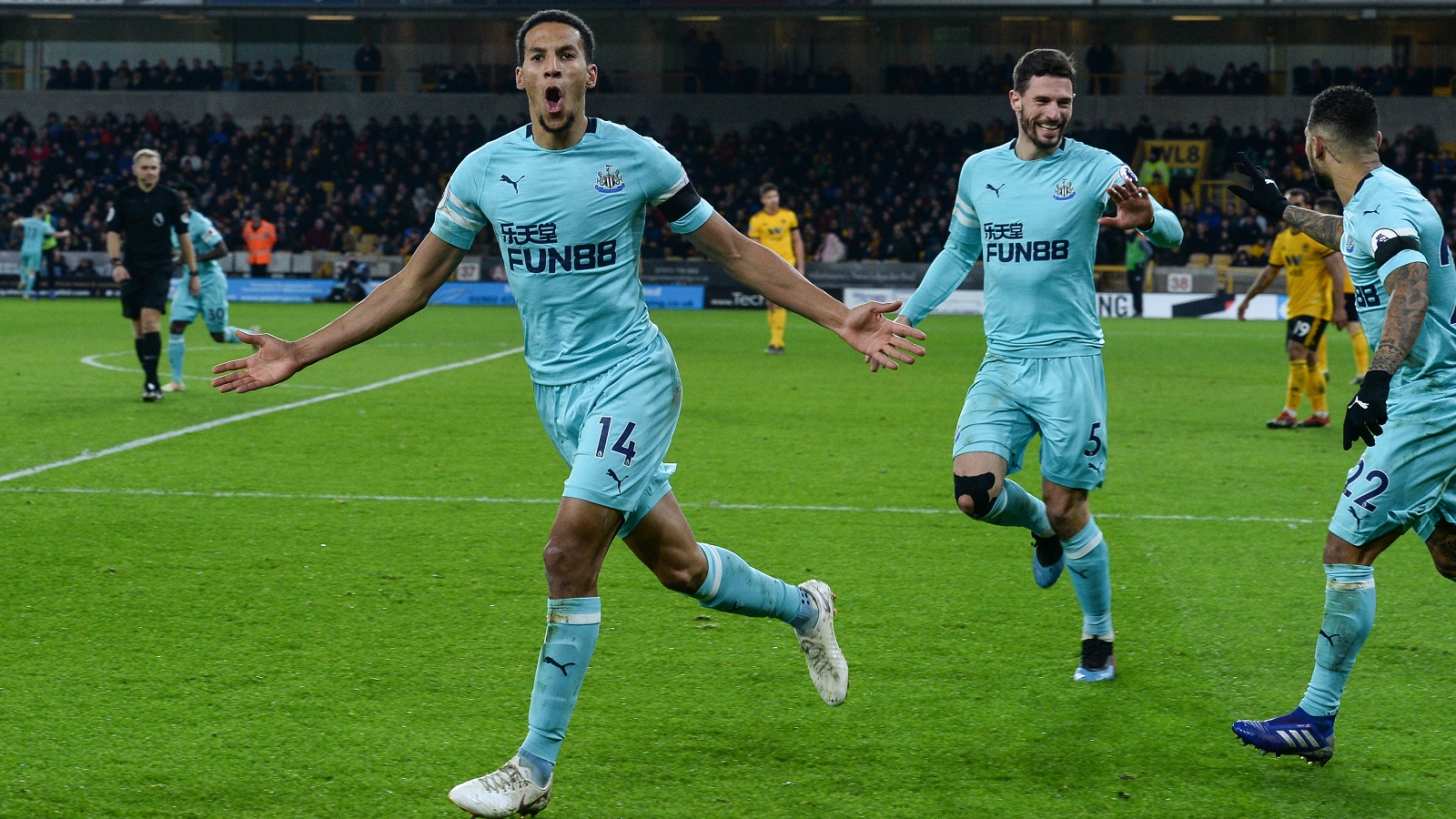Features
Big interview: Isaac Hayden – ‘It’s like suddenly people have had an epiphany. Where has this come from? I’ve always been like this’
Written by Tom Easterby
Newcastle United midfielder Isaac Hayden sat down for an in-depth interview with the club’s official matchday programme, UNITED, this week. It was published inside Saturday’s issue for the visit of Crystal Palace. You can now read the interview in its entirety here…
The tape has been rolling for almost an hour when Isaac Hayden begins to explain how he became so familiar with the A1. “When I look back, it was bonkers what I was doing,” he says, thinking of his preparations for a game at Arsenal in December 2017. His daughter, Adriana, had been born six weeks premature and was with her mother Lauren in London’s Portland Hospital, waiting to be brought home. “I was actually in the hospital on the Friday morning before the game. I took the flight up to Newcastle at seven o’clock, trained, and then got a three-hour train back down to London after training. (Adriana) couldn’t just go on a train, she had to go in a car. My missus was knackered, she was expressing milk – she was in an incubator for so long, she couldn’t hold her for like a week, so the only way to get her the milk was to express. She was knackered, she couldn’t drive back, so I had to.
“I did three trips to or from London in one day – I flew, got the train and drove. I got back in at about 11 o’clock. The next day, I trained, got the flight back down and played 90 minutes against Arsenal. I was ******. Absolutely ******.”
It was against this chaotic backdrop that much of Hayden’s last year was set. His fiancée, who suffered with hyperemesis gravidarum throughout her pregnancy, required care in the capital, as did their daughter, who had difficulties with breathing, allergies, reflux and temperature control.
Then 22, Essex-born Hayden had ‘never picked up a baby in his life’, and became torn between parental responsibilities down south and his work in the north east. He recalls squeezing in a pre-match meal aboard a Tyneside-bound LNER carriage hours before facing Leicester. Days off were spent in transit but trains were a nightmare; the temperature couldn’t be regulated. With his daughter all wrapped up in the car, they’d make five-hour treks down to London before Hayden, often alone, would return to Newcastle, sometimes on the same day. Back to work.
“It’s not like normal work where you can go in and say, ‘I’m feeling down’ or ‘this has happened or that has happened so I can’t go into work’, or take a certain amount of leave – it doesn’t work like that in football,” he says. “You can say, ‘I’m not going to come in’, but at the weekend, someone else is going to play and take your position. They could do well, and then you’re out of the team. You always have that element of ‘you have to keep going’, even if you were knackered, like I was, or mentally drained.”
The couple’s stresses were heightened by the distance they regularly had to cover, “and you end up falling out, having stupid arguments. You’re not yourselves.” Hayden recalls the specially-formulated milk he had to give his daughter with a grimace. “Honestly, the smell of it was horrific. Every time I made it I was like, ‘I’m so sorry I have to give you this’. She couldn’t drink normal milk, because she’d come out in red blotches, rashes, temperatures. But this stuff was so bad she didn’t want to drink it, so then she’d get dehydrated.” Then there would be 4am trips from their Newcastle home to hospital, where Adriana would be hooked up to a drip, and endless appointments in London.
The draining cycle continued, though he didn’t disclose it publicly, and last summer he sought a move from St. James’ Park. “I was, I’d say, two or three days from me going in the summer,” he explains. “Everything was done my side with personal terms, I’d even found a house – I’d even pretty much bought the house, obviously without exchanging. I’d spoken to a manager at a football club.”
His thoughts, already scrambled by the traumatic situation at home, became more conflicted. “Mentally, in my head, I prepared myself to go. You don’t go on the pre-season tour because things are hotting up and getting close, and then you don’t think about pre-season – you’re thinking, ‘I need to go to pre-season somewhere else’. So in your head, you’re sitting there thinking ‘well, I’m not going to be here so it doesn’t matter’. Your head’s somewhere else.
“You plan, and your family plans, for a certain scenario and then when that scenario doesn’t happen, it takes time to rejig everything and mentally prepare yourself for a different type of challenge.”
Last August, after a needless red card at Cardiff City, it would be difficult to imagine Hayden emerging as an indispensable member of the Magpies’ starting XI. After last month’s draw at Bournemouth – his 16th successive start – he was asked in the mixed zone to divulge the secret to his form. He answered, slightly bemused, and considered the question again as he drove home.
“There is no key. It’s just being given a chance to play – it’s really that simple,” he remembers thinking to himself. “People say, ‘he’s come from nowhere, is suddenly playing and his form’s been good’, but in 2018, before Christmas, I started three games – Chelsea away, Manchester City away and Arsenal at home. With no pre-season. So what type of form did you want me to get in those games? I hardly played for a year. What did you want me to do in the year where I was coming on for 10 minutes? What did you expect me to show?
“I didn’t have a bad game in that Arsenal game. I thought I did OK, considering I’d not played 90 minutes for six months. We only lost 2-1, kept it tight, kept it close, and I thought I could look at myself and say I’d done OK. But…” he continues, changing tone to reflect last autumn’s prevailing belief, “’he doesn’t want to be here, he doesn’t try’. But it’s what people perceived. What’s difficult is to change the perception of something. That’s a very hard thing to change. That’s one thing I’ve found. It takes a long time, and a lot of things have to happen for that perception to change.
“It happens when you’re committed, giving everything and playing regularly – more than once every three months. People can see what you’re doing and appreciate it. But that’s hard to do that when you don’t have a run of games. Football’s a very fickle game – people forget very, very quickly.”
There is detectable frustration in Hayden’s words and his take on the forming of judgements, and the speed at which that tends to happen in football, is intriguing. He cites attitudes towards the often-underappreciated Raheem Sterling as an example. “It’s easy to jump on the bandwagon. It’s the easiest thing to do,” he says. “If someone says, for example, that this player is rubbish, the easiest thing for someone else to do is say, ‘yeah’ – to agree. The hardest thing for a reporter to do, or someone in the media, is to challenge someone else’s views and take an opposite one. Someone will report on a game, and could say someone’s a four out of ten. ‘Yeah, he was rubbish, he was poor.’ But they haven’t even thought about the actual individual, what he did well or not. They just see a number.”
Last summer, while his teammates flew out to Ireland without him, Hayden appeared a mere number in United’s squad but his 2019 revival has forced many to rethink. As have his words; in an interview with The Times in March, he finally spoke about the personal circumstances that had led him to submit a transfer request – about Lauren and Adriana, the ceaseless journeys south and back, his desire to be a proper dad. Again, as he sits in an office at the Magpies’ training centre, feelings and convictions tumble out.
“Talking did help,” he nods. “I didn’t want to talk too much because when you go through a bad moment in football, the worst thing you can do is talk because sometimes, it makes things worse. You can talk to family and friends and people who are close to you and understand, but in terms of talking to the wider public, it’s not something you want to do. You just want to get through the bad moment, and that takes time.
“You worry that people don’t understand, or that things come across in the wrong way, but at the end of the day, it doesn’t really bother me in the slightest. I’ve shown that I have full commitment to the football club and I have given everything that I have every time I’ve stepped onto the pitch. People cannot question my mentality or my commitment to the football club during the season. You’re going to make mistakes – I got sent off.” Hayden puffs out his cheeks. “People make loads of mistakes in life. It’s about how you react to the mistakes, how you develop, change.”
He smiles at the suggestion that every Isaac Hayden interview seems to be prefaced by words like ‘honest’ or ‘candid’. “Everything makes me laugh at the minute,” he says. “It’s like suddenly people have had an epiphany. Where has this come from? I’ve always been like this. But it’s a perception and it’s hard to change. You have to be patient and keep going with what you do best, keep your standards high.”
Has there been a shift in opinion of him? “I hope so. It’s something to talk about, but it doesn’t affect my performances. If everyone hated me, it wouldn’t affect my performances. When I got into the team in January, there was nobody else available so I had to play. Even then the perception was bad, but I had to play. It didn’t affect me – I had a job to do.”
There are some things Hayden, looking back with lucidity, would have done differently during his most wearing year. “I even said to Lauren, I regret some of the things, the way that it happened. If I could rewind it, I would never, ever do some of the things that I did again.”
Like what? “She was born and in neo-natal care, but I was so worried about not letting the team or the manager down that I came back the next day. Lauren’s there, in neo-natal care, with a baby that’s just born and I’ve come back to train the next day. I wish I’d just said, ‘no, I’ll stay with you’. It was a mad period.
“I should never have done that, and I’ve apologised to my missus for that. For that week, or those few days, I shouldn’t have put football first, I should have put her and the baby first, and I didn’t, and I regret that. I should have got help sooner. We tried to do it by ourselves, and you try to do the right things and say ‘I don’t need help’, but sometimes you need to just admit ‘we need help with this situation’.
Hayden knew Mike Thalassitis, the former footballer and Love Island contestant who took his own life last month, though he explains with eloquence that he never reached any dangerous depths himself. He had lived a life largely free of emotional hardship but, having spent 15 years inside football’s bubble, he knows the last 15 months has changed and shaped him.
“When something comes along that’s more important than that, it tests your connection with football, massively,” he says. “When I was younger I was never the one who had loads of girlfriends, who would be partying at 16, 17 or going to nightclubs early. I was never that kid. I was always the kid who was dedicated, knew what his strengths were, what his weaknesses were. I was never going to be a world-beater but I knew what I wanted to achieve, what I wanted to do. So for something to come along that tested that, it tested me too. When the baby comes along and you look at her, your head goes. Nothing else matters. You just want a cuddle.”
Adriana is walking now, but is still well-accustomed to lengthy trips and Hayden admits it remains a source of guilt. “She’s a one-year-old who’s used to doing five-hour journeys. Most one-year-olds would be kicking and screaming after an hour, not happy at all. But she’s used to doing it. I’m sitting here looking at her thinking, ‘this isn’t fair on you anymore’.
“When I go home sometimes and we drive into London for the day, she’ll be in the car for an hour and then she’s looking at you when you stop the car, as if to say ‘are we not driving any further?’
Her father turned 24 a fortnight ago – “I feel about 40,” Hayden jokes – and, should his authoritative displays continue, is likely to play his 95th game for Newcastle before the summer. Then the questions will be asked all over again. Is he ready for them?
“I think I’ve made it very clear to the club’s hierarchy, and the fans. I’ve got my side of the story out – I’ve made it pretty clear how things go,” he says. “I don’t think there’ll be too many questions. I don’t think the summer’s going to be an issue. It’s pretty well-documented how I feel.
“But it won’t change my mentality. When I wasn’t playing, when I got sent off, when I was playing, when I was in the stands – it didn’t change my mentality, of working hard and doing the correct things, and it never will. That won’t change, even if I didn’t play another game or kick another ball for Newcastle. That’s just how I am.”
"You worry that people don’t understand, or that things come across in the wrong way, but at the end of the day, it doesn’t really bother me in the slightest. I’ve shown that I have full commitment to the football club and I have given everything that I have every time I’ve stepped onto the pitch. People cannot question my mentality or my commitment to the football club during the season."



